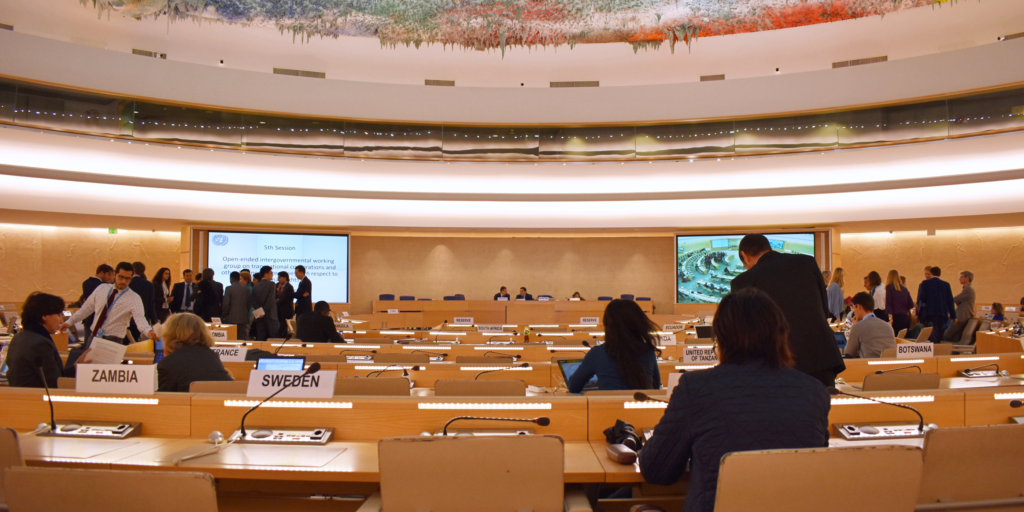CIDSE welcomes the advancements of the week in the text of the draft Treaty and calls for the EU to decisively step up its engagement now.
However, while progress was made, the pace remains too slow in light of the transformative Treaty that is needed to address the adverse impact of transnational corporations on communities throughout the world.
CIDSE was present at the negotiations with its members Broederlijk Delen, CAFOD, CCFD-Terre Solidaire, DKA, Entraide Fraternité, MISEREOR, and Trocaire on the basis of our written submission.
EU can no longer wait on the sidelines while citizens and Member States move forward
The EU announced from the beginning of the session that it would not engage in the negotiations in the absence of a mandate from Member States. The EU did highlight that the new draft is a considerable improvement, but said they would limit their interventions only to asking clarifying questions. Fortunately, EU Member States Spain, France and Belgium took up their responsibility to intervene individually, contributing on the important topics of human rights defenders and gender, human rights due diligence and corporate liability.
Together with members of the European Parliament such as Maria Arena (S&D, Belgium), Chair of the Human Rights Subcommittee, Manon Aubry (GUE/NGL, France) and Clare Daly (GUE/NGL, Ireland), CSOs called on the EU and Member States to engage constructively in negotiations without delay.
Irish and French citizens volunteering with CIDSE’s members Trócaire and CCFD-Terre Solidaire traveled to Geneva for the first time for this year’s session. They will continue to mobilize under the “Rights for People, Rules for Corporations” campaign through which 650,000 EU citizens have called for the EU to support a binding Treaty.
During the same week, negotiations were also underway in Vienna at the UN Commission on International Trade Law, with strong involvement by the EU, to reform Investor-State Dispute Settlement (ISDS) so as to further strengthen the rights of corporations to sue governments for their environmental and social regulation. CIDSE supports the call by the abovementioned campaign to abolish ISDS.
Measures to better protect communities affected by corporate abuses will require a strong push
The EU’s limited participation in the Geneva negotiations is difficult to comprehend. China, Russia and other states are actively intervening to shape the Treaty. Activists taking great risks to stand up for affected communities, are awaiting the EU’s participation as a potential ally of those defending human rights and the environment.
“This Treaty is very important for our communities that suffer at the hands of corporations and states in the name of profit, and for human rights defenders who risk their lives to speak up. I think the EU Member States should also speak up and support the Treaty to protect our communities from transnational corporations.” – Donald Henrandez, director of CEHPRODEC, Honduras
CIDSE’s main points of intervention were based on the experiences of our partners, including those from Colombia, Brazil, Peru, Honduras, Ecuador, Bolivia, Palestine, the Ivory Coast and the Pan-African Church who participated in the session.
Among the key issues for CIDSE are those relating to prevention, legal liability, protection of human rights and environmental defenders, gender sensitive human rights and environmental due diligence, Free, Prior and Informed Consent, choice of jurisdiction for people affected; and a clear provision establishing the primacy of human rights over the rights granted to corporations in trade and investment agreements. These provisions must be underpinned by a strong gender analysis.
The participation of civil society has been both a driver and a strength of this process. Civil society must continue to be able to take an active part going forward, as they are key to moving the process forward and securing an instrument focused on the rights of affected people.
Church actors are committed to protection of our common home and the people who care for it
The 5th session has proceeded during the same period as the Synod of the Bishops on the Pan-Amazonian region. The Synod offers the Church a space to reflect on its role in the face of environmental degradation and social injustices in the region, and to decide on paths of support. The Holy See’s consistent support for the Treaty process and the current Synodal process demonstrate the message of the Church for further protection of our common home and the people who care for it.
This has been complimented by new calls to action in Africa and in Europe: The Kenyan Bishops Conference, with support from SECAM, the Pan-African Bishops Conference, has released this week a statement calling on the Kenyan government and the international community to support the Treaty process. Bishop Werner Freistetter of the Austrian Bishops’ Conference also called on the Austrian government to actively support the Treaty process. These calls strengthen the growing voices for African, European and all States to step up their engagement to advance negotiations towards the adoption of an effective Treaty to protect human rights and the environment from corporate abuses.
The final informal session reflected the lack of will of some states to have transparent and inclusive negotiations. Thankfully, the consensus eventually reached protected the space for civil society to contribute while maintaining the principle responsibility of states to carry the process forward. However, this space did not allow for civil society to read their final statements. These will instead be included in the official report. The final report and recommendations and conclusions were adopted by the EU, a good sign for their future participation which CIDSE welcomes.

